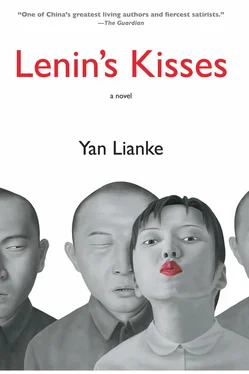Lenin’s Kisses, this careful dance with the specter of censorship is reflected in the volume’s unusual numbering scheme, in which only odd numbers are used for the notes, chapters, and so forth. While Yan explains that the work’s discontinuous numbering expresses the tragic sentiment of the novel as a whole (since in China odd numbers are considered inauspicious), we might also view the “missing” even-numbered chapters and notes as a tacit reminder of everything the novel necessarily leaves
unsaid as a result of Yan’s delicate courtship with China’s censorship system. In particular, the work’s fantastical descriptions of the hardships and sorrows endured by the residents of Liven speak evocatively to the fate of the countless ordinary citizens who risk falling through the proverbial cracks produced by contemporary China’s tectonic shift from high communism to hypercapitalism — citizens inadvertently sacrificed by a logic of economic progress that purports to be advancing the interests of the nation as a whole. In this way, the structure of the novel mirrors the historical juncture against which it is set — a juncture in which, to borrow the work’s opening description of a freak mid-summer snowfall, time itself might appear to have fallen “out of joint.”
— Carlos Rojas
CHAPTER 1: HEAT, SNOW, AND TEMPORAL INFIRMITY
Look, in the middle of a sweltering summer, when people couldn’t liven, 1it suddenly started snowing. This was hot snow. 3
Winter returned overnight. Or perhaps it was more that summer disappeared in the blink of an eye — and since autumn had not yet arrived, winter instead came hurrying back. During that year’s sweltering summer, time fell out of joint. It became insane, even downright mad. Overnight, everything degenerated into disorder and lawlessness. And then it began to snow.
Indeed, time itself fell ill. It went mad.
The wheat had already ripened, but the succulent wheat fragrance that had blanketed the land was dulled by this snowstorm. When the people of Liven 5had gone to sleep that evening they hadn’t bothered to pull up their sheets, and had lain naked in bed idly cooling themselves with fans made from paper and cattail leaves. After midnight, however, a fierce wind began blowing and everyone frantically reached for their covers. Even wrapped in their sheets, the villagers felt as though the bitterly cold air was cutting straight to their bones, and immediately started rummaging for their winter quilts.
When the villagers opened their front door the next morning, the women exclaimed, “Oh, it’s snowing! It’s hot summer snow.”
The men paused and sighed. “Damn, it’s a hot blizzard. It’s going to be another famine year.”
The children cried out brightly as though it were New Year’s Day: “It’s snowing!. . It’s snowing!. .”
The elms, poplars, mangroves, and pagoda trees were all blindingly white. In winter, it is merely the trees’ trunks and branches that get covered in snow, but in summer their canopies are transformed into enormous white umbrellas. When the leaves are no longer able to support the weight of the snow, it cascades to the ground.
This hot snow came just after the wheat had ripened, and many sites 7throughout the Balou mountains were transformed into winter wonderlands. In one field after another, the wheat stalks were pinned cruelly to the ground by the snow, and while an occasional ear of wheat might be visible, the vast majority of the stalks were splayed out as though they had been blown over by a tempest. If you were to stand on the ridge above the fields, however, you would still be able to smell the scent of wheat, like incense that lingers long after a coffin has been carted away.
Look, the hot snow that fell in the middle of this sweltering summer transformed the entire land into a winter wonderland, leaving everything pristinely white.
Needless to say, for the village of Liven — nestled in a valley deep in the Balou mountains — this snowfall in the fifth month of the wuyin Year of the Tiger, 1998, constituted a veritable natural disaster.
Further Reading:
1) To Liven. DIALECT (used mostly in western Henan and eastern Henan’s Balou mountains). The term means to experience “enjoyment, happiness, and passion,” and also carries connotations of finding pleasure in discomfort, or making pleasure out of discomfort.
3) Hot snow. DIAL. Refers to summer snow. People from this region usually call summer the “hot season,” and refer to summer snow as “hot snow.” They sometimes also speak of “hot flurries” and “hot blizzards.” It is unusual for snow to fall in the summer, but upon consulting local gazetteers I discovered that there is generally at least one such snowfall every decade or so, and there have even been periods in which there was hot snow for several summers in a row.
5) Liven. Legend has it that the origins of the village can be traced back to the Great Shanxi Relocation near the beginning of the Ming dynasty, between the reigns of the Hongwu and Yongle emperors. Imperial regulations specified that in each household with four members, one person would be exempt from the relocation order; in households with six members, two would be exempt; and in those with nine members, three would be exempt. The elderly and disabled in each household stayed behind while the young and healthy were relocated, and during the resulting exodus wails of partings resounded across the land. The first wave of relocations was followed by vigorous protests, which led the Ming court to announce that those unwilling to cooperate should gather beneath a large pagoda tree in Shanxi’s Hongdong county, while everyone else should return home and wait to be summoned. News of this announcement spread like wildfire through the region, and soon virtually the entire county was headed toward the tree. It is reported that there was one family in which the father was blind and the eldest son was a paraplegic, and in order to demonstrate his filial piety the family’s youngest son used a cart to haul his father and elder brother to the pagoda tree, whereupon he himself returned home to await relocation. Three days later, however, Ming troops forcibly relocated the hundred thousand people who had gathered beneath the tree, while allowing those waiting at home to stay behind.
For the purposes of the migration, no distinction was made between the blind, the crippled, and the elderly, or even between women and children. Consequently, the old blind man with a crippled son had no choice but to trudge along with everyone else, his son strapped to his back. The sight of a crippled boy guiding his blind father, who was carrying his son with his own elderly legs, was absolutely heartrending. Each day, the procession would start at dawn and march until nightfall, gradually making its way from Shanxi’s Hongdong county to the Balou mountain region in Henan province. The old man’s legs became swollen and his feet bloody, while his son cried and repeatedly tried to kill himself. The others watched them in despair, and petitioned the officials to allow them to drop out of the procession and return home. Each official relayed this petition to his superior until it finally reached the minister of migration, Hu Dahai. Hu’s response, however, was vicious: Whoever dares to release even a single person will be executed, and furthermore his entire family will be exiled to a distant province.
Everyone from Shandong to Shanxi to Henan knew about Hu Dahai. He was originally from Shandong, but near the end of the Yuan dynasty he fled famine and ended up in Shanxi. He was reputed to be ugly, but robust; straitlaced, but evil; unkempt, but heroic; outspoken, but narrow-minded; powerful, but lazy. The people held him in deep contempt, and when he went begging for alms everyone avoided him like the plague. Even if he showed up at people’s homes while they were in a middle of a meal, they would refuse to let him in. He arrived in Hongdong one day hungry and thirsty, and saw an expensive tile and brick house. He extended his hand to ask for alms, but not only did the owner of the house refuse to give him any food, he taunted Hu by taking a freshly baked scallion pancake and using it to wipe his grandson’s butt before feeding it to his dog.
Читать дальше












